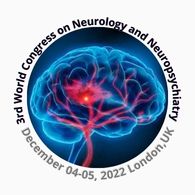Call for Abstract
Scientific Program
3rd World Congress on Neurology and Neuropsychiatry, will be organized around the theme “Exploring the challenges faced in mental health and disorders”
Neuro Psychiatry 2022 is comprised of keynote and speakers sessions on latest cutting edge research designed to offer comprehensive global discussions that address current issues in Neuro Psychiatry 2022
Submit your abstract to any of the mentioned tracks.
Register now for the conference by choosing an appropriate package suitable to you.

